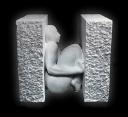 It’s a dark, dank, warmish-coldish day here, the type of day that makes you really wish you had a nice fireplace to sit in front of with a good book, with a little bread, wine, and cheese.
It’s a dark, dank, warmish-coldish day here, the type of day that makes you really wish you had a nice fireplace to sit in front of with a good book, with a little bread, wine, and cheese.
Alas.
But in thinking of fireplaces, it got me thinking about the routine of cleaning up from last night’s fire before making a new one; shoveling out all the cold, black ash and scooping it into the faux-bronze bucket, trying to keep it in one place lest it get all over you, the furniture, or on the bread or cheese or in the wine.
Hmmmm.
Downstairs, the wife is preparing a scrumptious dinner for tonight, and the house is filled with the aroma of chicken, eggplant, garlic and olive oil, cheese, a loaf of fresh bread, and who knows what else. We’re having guests tonight, and my desire for wonderful food is in fully affected. It’s also the night where our family celebrates our weekly family Eucharist.
Hmmmm.
Ashes. Desire. Eucharist. Hospitality. Fire. Food. Back to Bernard.
The Abbot writes that the Good Householder provides for his family and for his guests, especially in bad times, by feeding them with the bread of life, and in so doing he also feeds Himself. Bernard then writes that it is our penitence, our salvation, that is His food, that we ourselves are his food. A remarkable turn on the Eucharist theme! “Does he not eat ashes as though they were bread? For I am a sinner; it is I who am the ashes to be eaten by him. I am chewed as I am reproved by him; I am swallowed as I am taught; I am digested as I am changed; I am assimilated as I am transformed; I am made one as I am conformed” (Sermons on the Song of Songs 71.5). Bernard likens our spiritual state in repentance to ash, the result of a purifying fire of desire or affectus that burns our sin into ash, which becomes the food of God and Christ. In a reciprocal spiritual meal, the Eucharist becomes truly communal.
But eating ash? Ok, in a spiritual sense, this is powerful stuff. We’re dust and ash, right, and we’ll return to dust and ash; good imagery and metaphor. But what about eating it?
Turns out that this is a question that occupied St. Francis of Assisi. St. Bonaventure tells us that the patron of poverty, when he was tempted to indulge his bodily desires for fine food, would sprinkle the charred condiment of his fire onto his bread and cheese. Talk about a killjoy. The spiritual image of Bernard, signifying desire, becomes for Francis a sign for destitution. Reflecting on this, David James Duncan writes “Perhaps, I would dare guess, because food topped with ashes is exceedingly hard for the mind or body to desire, and ‘desirelessness,’ said the excommunicated saint Meister Eckhart, ‘is the virgin who eternally gives birth to the Son.’ Having perceived this virginity and birth with ashes — having forced even his body to pray when it tasted the wrecked meal and exclaimed, “Jesus Christ, Francis!” — the French Guy lit into his meal with gooey, gray-mouthed relish” (DJD, God Laughs and Plays, 80). Duncan goes onto experience for himself the taste of “finality” as Francis experienced it.
Makes me think of the relationship between the spiritual and the physical with a little more sensitivity, that Francis had the stones to actually take seriously Bernard’s metaphor and thus get a taste of how great the Housekeeper’s desire must be to commune with us. Maybe tonight I’ll put a plate of ash on the table, next to the bread, next to the wine, and next to the china, and dare any of us to “taste and see that the LORD is good” and to seriously reflect on our own spiritual state.
There’s a popular sandwich chain with the slogan “Mm mm mm mm mm…Toasty!”
Exactly. Francis would approve.
 Well, I did it. I went. Feeling spiritually downcast these days, I went to one of the local Southern Baptist mini-megachurches in the area for an evening service tonight. I just needed to do it. I sucked it up, decided that I didn’t have to have a “high-church” experience tonight, or traditional baptist hymnology on an organ, but wanted to be with people who genuinely love their image of God and Christ. Most of all, I just wanted to sing contemporary praise music. I can’t explain why, and even if I could, it would be in forced academicese.
Well, I did it. I went. Feeling spiritually downcast these days, I went to one of the local Southern Baptist mini-megachurches in the area for an evening service tonight. I just needed to do it. I sucked it up, decided that I didn’t have to have a “high-church” experience tonight, or traditional baptist hymnology on an organ, but wanted to be with people who genuinely love their image of God and Christ. Most of all, I just wanted to sing contemporary praise music. I can’t explain why, and even if I could, it would be in forced academicese.
 A few words of wisdom from the Desert Father Evagrius before hitting the sack:
A few words of wisdom from the Desert Father Evagrius before hitting the sack:
 whiff Nautica or whatever. Having a marketing image that provides an alternative to ads like Nautica’s or Calvin Klein’s is commendable, but to actually say it’s “biblical” goes a bit over the top. Some things can be good, and sensual, without having to justify it as being biblical.
whiff Nautica or whatever. Having a marketing image that provides an alternative to ads like Nautica’s or Calvin Klein’s is commendable, but to actually say it’s “biblical” goes a bit over the top. Some things can be good, and sensual, without having to justify it as being biblical. I’m sitting here doing a little reading from Davis McCombs’ Ultima Thule, a collection of the author’s poems inspired by Mammoth Cave in Kentucky. Told from the vantage point of a slave cavern guide to tourists of Mammoth Cave in the 19th century, these poems are stunning reflections on beauty and provide some pretty awesome metaphors for life, spirituality, the whole bit. As a religionist and student of scriptures who also views the natural world in metaphoric terms for deep spirituality and community ethics, I was particularly taken by the poem “Tours:”
I’m sitting here doing a little reading from Davis McCombs’ Ultima Thule, a collection of the author’s poems inspired by Mammoth Cave in Kentucky. Told from the vantage point of a slave cavern guide to tourists of Mammoth Cave in the 19th century, these poems are stunning reflections on beauty and provide some pretty awesome metaphors for life, spirituality, the whole bit. As a religionist and student of scriptures who also views the natural world in metaphoric terms for deep spirituality and community ethics, I was particularly taken by the poem “Tours:”


 It’s a dark, dank, warmish-coldish day here, the type of day that makes you really wish you had a nice fireplace to sit in front of with a good book, with a little bread, wine, and cheese.
It’s a dark, dank, warmish-coldish day here, the type of day that makes you really wish you had a nice fireplace to sit in front of with a good book, with a little bread, wine, and cheese. Some Lenten thoughts from St. Bernard of Clairvaux: “Love is an affection of the soul, not a contract. Moving us freely, it makes us spontaneous. … It is stupidity and madness to want always that which can neither satisfy nor even diminish your desire. … The Just are feasting and rejoicing in the sight of God, delighting in their gladness. Here is fullness without disgust; here is insatiable curiosity without restlessness; here is that eternal, inexplicable desire knowing no want. At last, here is that sober intoxication of truth, not from overdrinking, not reeking with wine, but burning for God.”
Some Lenten thoughts from St. Bernard of Clairvaux: “Love is an affection of the soul, not a contract. Moving us freely, it makes us spontaneous. … It is stupidity and madness to want always that which can neither satisfy nor even diminish your desire. … The Just are feasting and rejoicing in the sight of God, delighting in their gladness. Here is fullness without disgust; here is insatiable curiosity without restlessness; here is that eternal, inexplicable desire knowing no want. At last, here is that sober intoxication of truth, not from overdrinking, not reeking with wine, but burning for God.”